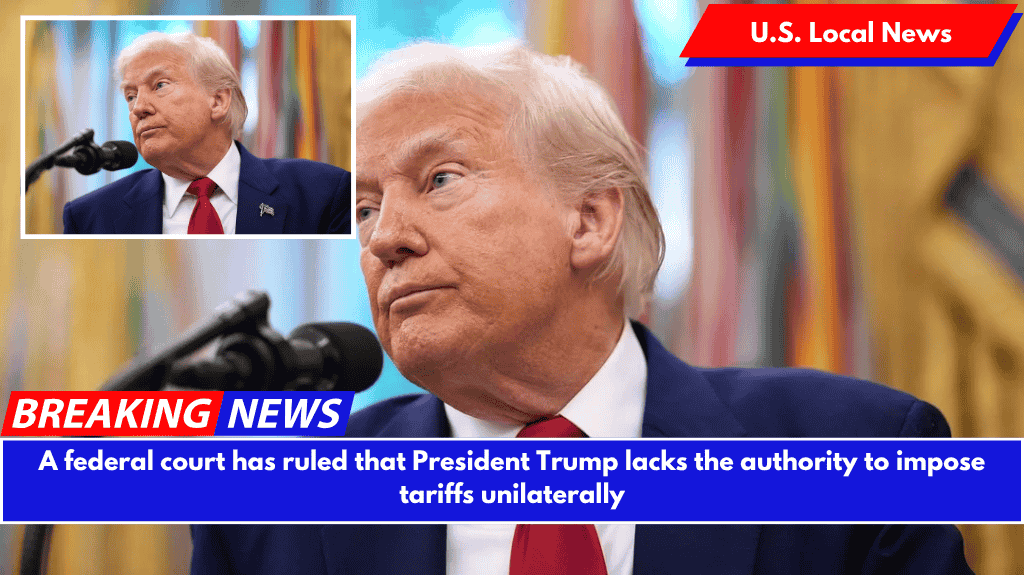In a sweeping decision, a three-judge panel of the New York-based Court of International Trade overturned President Donald Trump’s global tariffs as “contrary to law.”
The judges determined that the International Emergency Economic Powers Act, which Trump used to enact his tariffs, does not grant him the “unlimited” authority to levy tariffs, as the president has in recent months.
“The President’s assertion of tariff-making authority in this case, which is not limited in duration or scope, exceeds any tariff authority delegated to the President under IEEPA. “The Worldwide and Retaliatory tariffs are thus ultra vires and contrary to law,” the judges concluded.
According to the judges, Congress, not the president, has the authority to impose tariffs in most cases, and Trump’s tariffs do not meet the narrow requirement of a “unusual and extraordinary threat” that would allow him to act alone.
“Because the Constitution expressly assigns tariff power to Congress, we do not interpret IEEPA to delegate unlimited tariff authority to the President. “We instead interpret IEEPA’s provisions to impose meaningful limits on any such authority it confers,” the ruling stated.
Responding to the decision, White House spokesman Kush Desai cited the trade deficit and stated, “It is not for unelected judges to decide how to properly address a national emergency,” adding that the administration is committed to using “every lever of executive power to address this crisis.”
The Trump administration has already filed a notice of appeal to challenge Wednesday’s ruling.
The case now moves to the United States Court of Appeals for the Federal Circuit, where they can seek a stay of the order.
The Court of International Trade issued its decision in two cases, one filed by a group of small businesses and the other by 12 Democratic attorneys general.
According to Nevada Attorney General Aaron Ford, the decision is “a win for the rule of law and for Nevadans’ pocketbooks.”
“I am extremely pleased with the court’s decision to strike down these tariffs; they were both unlawful and economically destructive,” he stated. “The president had no legal authority to impose these tariffs, and his unlawful actions would have caused billions of dollars of damage to the American economy.”
Since imposing tariffs on over 50 countries in April, Trump’s administration has faced half a dozen lawsuits challenging its authority to do so without congressional approval.
New York Attorney General Letitia James described the decision as a “major victory for our efforts to uphold the law and protect New Yorkers from illegal policies that threaten American jobs and the economy.”
“The law is clear: no president has the authority to unilaterally raise taxes whenever they want. “These tariffs are a massive tax hike on working families and American businesses that, if allowed to continue, would have resulted in increased inflation, economic damage to businesses of all sizes, and job losses across the country,” James said.
Lawyers for small businesses argued that the International Emergency Economic Powers Act, which Trump used to impose tariffs, does not allow for “across-the-board worldwide tariffs,” and that Trump’s justification was invalid.
“His claimed emergency is a figment of his own imagination,” the lawsuit read. “Trade deficits, which have persisted for decades without causing economic harm, are not an emergency.”
During a hearing earlier this month, a panel of three judges appointed by Presidents Obama, Trump, and Reagan pressed a lawyer for small businesses to provide a legal basis for overturning the tariffs.
While a different court determined in the 1970s that the Trading with the Enemy Act of 1917, which preceded the International Emergency Economic Powers Act, gave the president the authority to impose tariffs, no court has addressed whether the president can impose tariffs unilaterally under the IEEPA.
At a May 13 hearing, the plaintiffs’ lawyer, Jeffrey Schwab of the conservative Liberty Justice Center, argued that Trump’s emergency justification for tariffs falls short of legal requirements.
“I’m asking this court to be an umpire and call a strike; you’re asking where the strike zone is. “Is it at or slightly below the knees?” Schwab argued. “I’m saying it’s a wild pitch and it’s on the other side of the batter and hits the backstop, so we don’t need to debate that.”
The decision marks the first time a federal court has ruled on the legality of Trump’s tariffs. In May, a federal judge in Florida nominated by Trump suggested the president has the authority to unilaterally impose tariffs, but chose to refer the case to the Court of International Trade.











